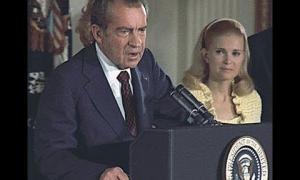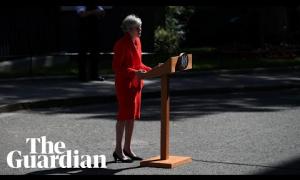An effort to understand
April 03, 2018
The night Martin Luther King was assassinated, Robert Kennedy gave a speech that went down in history. In a search for a more complete truth, let's bring it back up.
The night Martin Luther King was assassinated, Robert F. Kennedy gave a speech in Indianapolis that kept the city from rioting. Except, that’s not how everybody remembers it. This account, by Vital Speeches editor David Murray—is this week's Speech of the Week. —ed.
Fifty years ago today, Martin Luther King became immortal. So did Robert F. Kennedy, when he shocked a predominantly African-American crowd in Indianapolis by announcing, “Martin Luther King was shot and was killed tonight in Memphis, Tennessee.” And then, as the story goes, Kennedy proceeded to give an eloquent appeal for peace that calmed the people and made Indianapolis one of the only major American cities where violence didn’t erupt. “April 4, 1968: How RFK saved Indianapolis,” reads the standard retrospective in the Indianapolis Star-Tribune.
I’ve been telling the story the same way for many years in lectures on rhetoric that I deliver, as editor of Vital Speeches and executive director of the Professional Speechwriters Association. I love the speech that Kennedy delivered, and so do the audiences I show it to.
But after a visit last month to the site of the Kennedy speech, and a subsequent conversation with a single African-American Indianapolis native who recalls that night, I’ll never tell the story the same way again. From now on, I’ll tell a more complete version, that includes the perspective I heard from William Oliver, an Indianapolis City Councilman who remembers the night very differently, and spoke about it searchingly and carefully.
Here’s how it went down—as it’s recorded by history, and as it’s remembered from outside the rhetorical hagiography.
Before boarding a plane after a campaign stop at Notre Dame to head to another appearance in inner-city Indianapolis, Kennedy learned that King had been shot. Upon landing, he learned that King had died of his wound. The mayor of Indianapolis warned Kennedy’s campaign staff that the police couldn’t guarantee his safety. His staff urged him to simply cancel the political rally out of respect for King. But Kennedy insisted on going through with the appearance. When he arrived at 17th and Broadway and climbed up on the flatbed truck that served as a podium, he was further informed that many in the audience of about 2,500 were unaware that King was dead.
So Kennedy had to deliver the news and then contend, rhetorically, with the reaction.
William Oliver was one of the overwhelming majority of black Indianapolis residents who didn’t attend the Kennedy rally. A 28-year-old screw machine operator at the local Chrysler plant, Oliver was at another political rally three miles across town, this one for Congressman Andrew Jacobs, who was running for reelection, backed by the United Auto Workers union. Oliver was aware that Kennedy was in town, but he wouldn’t have attended the Kennedy rally in any case, because it was located in a neighborhood unfriendly to the neighborhood he grew up in: “I had no business going there and they had no business going where I was.” And anyway, Oliver said, “Who was Bobby Kennedy?” All he knew about the Kennedys was that it seemed as though they were “kind of procrastinating about civil rights in the South.”
In fact, Martin Luther King hadn’t quite mesmerized the young man either. King was maligned in the local papers for being disruptive on one hand and ineffective on the other, and Oliver was influenced by those views. He thinks a lot more people claim to have literally and figuratively marched with King than actually did. But the night he learned King was killed—when word spread through the crowd at the Jacobs rally “and the women started wailing”—he describes a feeling of “emptiness, like, ‘They—they—have taken something away from us. One of the few good things about the whole world was this Martin King. Is he really gone? It took our hope away.”
“I didn’t know he was here,” Oliver said, “until he was gone.”
Kennedy has gotten great credit over the years for showing up in that neighborhood to address an audience whose support—even whose civility—he could not count on. And as he began his speech, Kennedy looked physically vulnerable as he acknowledged with a quavering voice the emotional situation: “For those of you who are black—considering the evidence is that there were white people who were responsible—you can be filled with bitterness, and with hatred, and a desire for revenge.”
Seeing Kennedy in that context seemed to make an impression on the audience, because even in their shock and confusion, they listened mostly quietly to the rest of the five-minute speech, as Kennedy acknowledged that he had felt “hatred and mistrust” in his own heart after “I had a member of my family killed.” With gathering confidence, called on his audience and the nation to “make an effort, as Martin Luther King did, to understand.”
What we need in the United States is not division. What we need in the United States is not violence and lawlessness, but is love, and wisdom, and compassion toward one another; and a feeling of justice toward those who still suffer within our country, whether they be white or whether they be black.
So I ask you tonight to return home, to say a prayer for the family of Martin Luther King … but more importantly to say a prayer for our own country, which all of us love—a prayer for understanding and that compassion of which I just spoke.
And with that, the people did return home, and there was a sorrowful peace in Indianapolis, instead of a flaming, violent rage that consumed 100 American cities that night.
No, says Oliver. He remembers many times since in his life when racial unrest begat violence in various American cities. For reasons Oliver doesn’t understand, Indianapolis’s black community never resorted, he said, to “burnin’ down the town.”
Kennedy? “He didn’t do this.” Oliver is careful to say, “Bobby Kennedy didn’t write his obituary,” and never claimed to have saved Indianapolis “from going to hell that night.” Kennedy was assassinated two months and a day later, and his legend was burnished by others.
At the corner where Kennedy delivered his speech, there stands a sculpture that shows Kennedy and King reaching out to one another, across a sidewalk divide. Every April 4, Oliver attends a remembrance there along with a few hundred other Indianapolis residents. It seems to him that each year, Kennedy’s speech gets more emphasis and Martin Luther King’s life gets less. And Oliver thinks to himself, “Wait a minute. We’re making a monument out of someone who just passed on the information.”
Of course, Kennedy did much more in the speech than that. Perhaps ironically, what professional speechwriters love most about the speech is a moment that no speechwriter would have created—Kennedy’s quoting, in the middle of the speech, of “my favorite poem, my—my favorite poet was Aeschylus. And he once wrote,
Even in our sleep, pain which cannot forget
falls drop by drop upon the heart,
until, in our own despair,
against our will,
comes wisdom
through the awful grace of God.
“I cannot imagine a single contemporary ‘handled’ politician or other leader going into that situation and quoting Aeschylus—would not happen,” wrote Mike Field, a longtime speechwriter who has also lectured on Kennedy’s speech. Where a speechwriter might search Langston Hughes poems to find something the audience would appreciate, Kennedy spoke about what had touched his own soul, which, Field says, “makes a speech cross a vast chasm where the speaker is willing to say ‘this is where I am at and I am reaching across.’”
“Kennedy went right to the heart of who he was to craft that speech,” says another speechwriter, Boe Workman, who wrote a paper on the speech when he was in graduate school four decades ago, “and that authenticity really came through.”
I sent Oliver a YouTube link to the speech, and asked him to watch it. He had never seen the whole speech before, he told me. He watched it twice. “I would appreciate it, today,” he said. “I can feel every word of that now, and it almost makes me want to tear up.”
But in 1968, George Wallace was running in the Democratic primary. There was a bitter racial argument over bussing. Oliver’s car was vandalized in the lot at the plant. “I remember those events,” Oliver says. He thinks Kennedy’s words would have meant little to him then.
He explains his reactions to Kennedy’s speech then and now, to people who appreciate those involved in the Underground Railroad during slavery: heroic in hindsight—and in perspective.
The day after his speech in Indianapolis, with the help of his speechwriters, Kennedy gave a more formal version, at the Cleveland City Club. “We must admit the vanity of our false distinctions among men and learn to find our own advancement in the search for the advancement of all,” he said. “We must recognize that this short life can neither be ennobled or enriched by hatred or revenge … that those who live with us are our brothers, that they share with us the same short movement of life, that they seek—as we do—nothing but the chance to live out their lives in purpose and happiness, winning what satisfaction and fulfillment they can.”
Oliver does not remember what he did on April 5, 1968. “What day of the week was it?” he asked me. It was a Friday. He probably went to work at the Chrysler plant.
And tonight in the park where Robert F. Kennedy called for understanding 50 years ago, Kennedy and Martin Luther King reach out to each other in perpetuity.
They can only be joined by us, the living, who walk between them—and make an effort to understand. —DM





